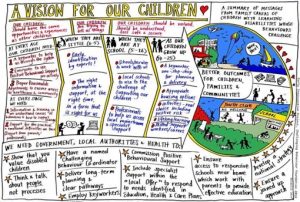
BBC reports on Hesley Group care home investigation
The BBC has reported on safeguarding issues in Hesley Group services for children and adults with learning disabilities.

On 20th of April 2023, the Child Safeguarding Practice Review Panel published the second of two reports into residential settings run by the Hesley Group in Doncaster.
Today (20th April 2023) the Child Safeguarding Practice Review Panel published the second of two reports about residential care settings run by the Hesley Group in the Doncaster area. These reports focus on the experiences of 108 children and young adults with learning disabilities and complex needs between 1st January 2018 and March 21st 2021.
The reports record that the children:
The first report highlighted that the children’s vulnerability was increased by the distance that they were placed from home, and that inadequate leadership in the Hesley services resulted in a culture of poor practice and misconduct by care staff. The second report builds on the previous findings and sets out a shared vision for the education, health and care of children with disabilities and complex needs.
The report recognises that current local support for children with learning disabilities and complex needs is inadequate. Lack of suitable local provision results in children being placed in long-term residential placements unnecessarily; the report explains that some of the children at the Hesley residential setting could have had their needs met in their local community. Instead, they were placed in institutions away from loving families resulting in additional trauma, harm and institutionalisation.
Better commissioning of sufficient local quality provision is reflected in the four ‘priority areas for improvement’ identified in the report:
The phase 2 report also found that the Hesley Group failed to respect the culture and identity of some children in their care. It reports evidence that most black female children had their hair shaved short on arrival, sometimes against the wishes of their family: unacceptable, degrading and depersonalising practices which marginalised the cultural needs of the children. A child’s racial, ethnic and cultural background should be understood and respected by the staff in the setting supporting them and is essential to their wellbeing.
National recommendations also include: access to specialist independent advocacy for the children; independent advice for children and families when a long-term residential placement is being considered; statutory requirements for local authorities and integrated care boards (ICBs) to jointly commission safe, sufficient and appropriate local provision; a new strategy to address longstanding workforce challenges; and enhanced oversight of safeguarding risks by host local authorities and ICBs.
The CBF welcomes the recommendations and priorities outlined in the phase 2 report. What needs to follow this report is a commitment to their implementation and action.
Our CEO, Viv Cooper, says:
“The experiences of the children described in this report are indefensible and will have significant and long term consequences for them and their families. There must be immediate and specialist support put in place to help them manage the trauma which the system has caused and is responsible for.
In order to protect all children with learning disabilities and complex needs from significant harm, the government must urgently initiate a new programme of work with ring-fenced funding to drive improvements in local provision and support and establish effective safeguarding systems.
This work programme must be specific to the needs of children who have severe learning disabilities and often have complex healthcare needs including behaviours that challenge. The government has repeatedly ‘committed to change’ in the past but thus far these have been empty words.
There were serious systemic failures at every level and no-one in a position of power and authority can justify inaction to address the known causes.
All children need love, care and support: we must end the practice of placing disabled children far away from their families because it is administratively more convenient to buy a bed in an expensive out of area institutional placement than improve local support and services.
Inaction and complacency are inexcusable when alternative provision is known to deliver better outcomes for these children.”
Services need to share parents’ aspirations for their children to have access to the full range of services in the community and the same opportunities as other children. This was illustrated in the report with CBF’s graphic which was co-produced with family carers, A Vision For Our Children.

Local community provision must be developed in all areas to meet the needs of children with disabilities and enable them to stay close to home. This should include early intervention, crisis support, and creative commissioning to keep children with their family and community. As it stands, families experience a lack of support until crisis point, and are then presented with distant 52-week placements as the ‘only option’ to meet their child’s needs.Local authorities are failing in their duty (under Section 26 of the Children and Families Act 2014) to ensure there are sufficient appropriate placements in the local area for children with specialeducational needs and disabilities and children in care.
Read more about Early Intervention
Read the full Phase 2 report by the Child Safeguarding Practice Review Panel
Read the Challenging Behaviour Foundation’s statement about the phase 1 report
Family Support Service
If you have been affected by any of the issues raised in this statement, you can call the Family Support Service on 0300 666 0126
Or email us at support@thecbf.org.uk
We are open at the following times:
Monday – Thursday: 9am – 5pm
Friday: 9am – 3pm
We offer information about challenging behaviour to anyone who provides support to a child, young person or adult with a severe learning disability. We can also signpost you to other specialist organisations and sources of information.
Please note we are a small support service so you may not be able to get support straight away. We will support families with urgent concerns as a priority.
Professionals are also welcome to contact the CBF.

The BBC has reported on safeguarding issues in Hesley Group services for children and adults with learning disabilities.

On the 26th of October 2022, the Child Safeguarding Practice Review Panel published their findings into residential settings in Doncaster run by the Hesley Group.